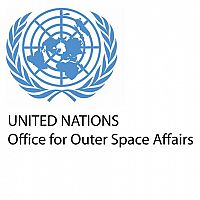›UN/Austria Symposium: "Space Applications for Sustainable Development Goal 13: Climate Action"
The 2020 UN/Austria Symposium "Space Applications for Sustainable Development Goal 13: Climate Action" will take place from 1-3 September. It will discuss how space technologies support climate action.
Climate action is one of the most pressing priorities for action within the Sustainable Development Goals framework. The last 5 years were the hottest on record and 14 of the 15 hottest years have occurred since 2000. Average sea levels have risen by 23 cm since 1880 and by 9 cm in the last 25 years. Earth observation is an essential tool to monitor these changes: out of the 50 essential climate change variables, 26 can only be measured from space. Space technologies can contribute significantly to global efforts to mitigate and adapt to climate change. This becomes evident when mapping contributions of space-based technologies to the SDGs: out of the 169 SDG targets, 65 are reliant on geolocation or Earth observation.
The event aims to showcase concrete climate action cases through demonstrations of applications using space solutions. Users of space applications will present lessons learnt and experts will discuss the role of space applications in climate-related policies. A range of different presentation formats will be used to highlight various aspects of space applications for climate action, including best practices and live demonstrations of solutions and services available for developing countries.
Specific policy discussions will enable exchange of experiences and know-how on how to incorporate space applications and tools for climate action in environmental policy. The overarching objective of the Symposium is to offer users, with particular focus on developing countries, an opportunity to explore tools, policies, and approaches that could be adopted in their respective regional, national or local context.
BACKGROUND
The UN/Austria Symposium has taken place under the Programme of Space Applications of the United Nations Office for Outer Space Affairs in Graz, Austria, since 1994. Since the first Symposium entitled "Enhancing Social, Economic and Environmental Security through Space Technology", more than 2500 participants have attended the events. They addressed a variety of themes, ranging from security to youth, as well as the use of space for sustainable development, space accessibility, and international cooperation.
The Symposia series has provided a forum for discussion between the different stakeholder groups of the wider space community, including the diplomatic community, statisticians, the private sector and academia, as well as UN entities. The main purpose of the Symposia remains to enable discussions on the use of space tools and applications, on capacity-building and to support policymaking.
OBJECTIVES
The main objectives of the Symposium are:
- To foster the exchange of best practices in the use of space applications for concrete climate change mitigation and/or climate-related adaptation activities.
- To share know-how and to explore what services are available, demonstrating how they can be accessed and used to support climate action according to national priorities.
- To showcase available toolboxes already implemented within case studies or pilot projects with the aim of promoting adoption of tested tools and approaches.
- To discuss the role of UNOOSA in implementing capacity-building activities, particularly in developing countries.
- To raise awareness in the various user groups, in particular government representatives, the diplomatic community UN and international organisations as well as NGOs on available space-related activities, services and cooperation programs.
- To showcase how space-related policies have been developed and how they are used in different countries.
- To discuss how international climate related regulations, such as the "Nationally Determined Contributions" of the Paris Agreement, can be fulfilled through the use of space technologies and applications.
Presentations made during the Workshop will be published on the website of the Office for Outer Space Affairs to increase awareness about the capabilities and benefits of space technology applications. The report of the Workshop and its recommendations will be distributed to the participants and the space technology user community.
PROGRAMME
The programme will include plenary sessions interspersed with enough time for exchanges of opinions to identify the participants' priority areas and examine what possible partnerships could be established. As a preliminary suggestion, the following subtopics, with a focus on climate action, will be addressed during the Symposium:
- Disaster management and emergency response
- Water management
- Agriculture
- Reduction of emissions by optimising transport networks
- Health and epidemics
- Energy, including reduction of emissions caused by energy production and transport
- Urban planning and flood prevention
- Climate migration
- Incorporating space-based technologies, applications and tools in climate policies at the local, national, regional, international level (cf Target 13.2 to integrate climate change measures into national policies, strategies and planning)
- Climate change monitoring
- General principles of international environmental law and space activities
Presentation of case studies, pilot projects and lessons learnt in respective countries are welcome.
Tweets by spaceagendaTrack this event on your Apple calendar














 Online
Online